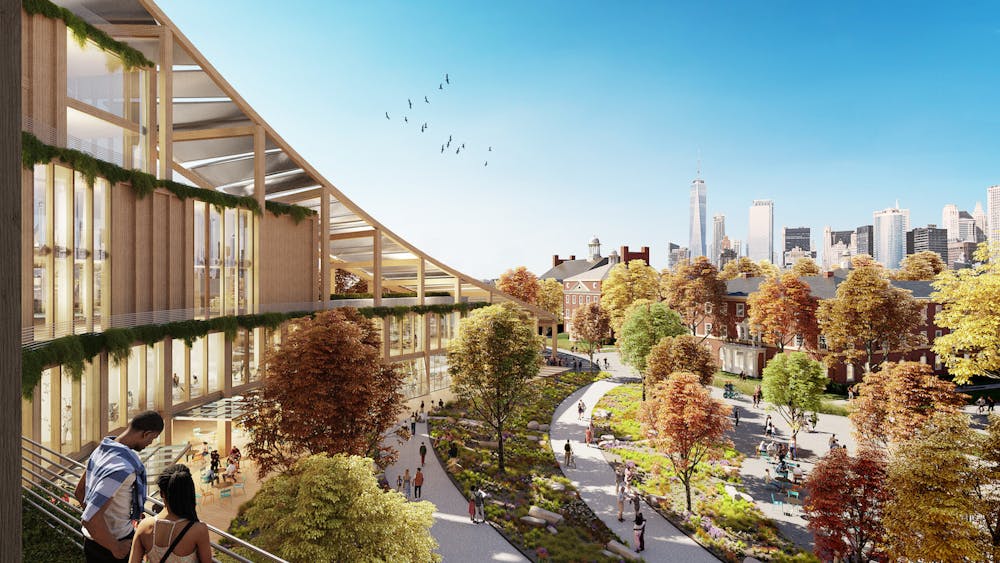The Pratt School of Engineering hosted a virtual town hall Thursday evening to inform community stakeholders about plans for the New York Climate Exchange, a $700 million living-learning facility for environmental solutions.
The NYCE, which is slated to begin construction in 2025 on Governors Island in New York City, will allow Duke to connect with other universities and public and private partner organizations to engage in collaborative research, education, and development around climate issues.
“I think the ethos of the center is that it is to take risks, to really push the envelope of what’s possible with respect to climate solutions,” said Jerome Lynch, Vinik Dean of the Pratt School of Engineering.
Lynch was joined on Zoom by Sara Oliver, director of the climate and sustainability engineering master’s program, as well as several Duke faculty members involved in developing Duke’s role in the Exchange to present the initiative to the larger community.
The plans
The 400,000-square-foot endeavor is expected to incur $700 million in development costs, with $150 million already seeded by the Trust and the City of New York and the remaining $550 million to come from philanthropy efforts. Facilities are expected to be completed in 2028.
The Exchange is built on three core pillars: collaboration, impact and justice. A robust partner network of international stakeholders encourages collaboration across geographic regions and academic disciplines, amplifying the impact of research efforts and sustainable solutions while prioritizing accessibility and inclusion at every level.
“[It] really focuses on confronting urgent climate impacts and issues of environmental injustice, breaking down the silos through … innovative, scalable and sustainable models that would allow for rapid development of new, urban climate solutions,” Lynch said.
Oliver noted that the Exchange’s initiatives align with the values of the Duke Climate Commitment, highlighting opportunities for community members to engage in research, community outreach and collaboration with external partners.
Members of Duke faculty and administration are collaborating with other Exchange partners to produce this programming. Teams focused on specific deliverables — like designing a “Hackathon” sponsored by the International Business Machines Corporation and Pace University — began working last week to finalize these plans by May 2024.
The initial idea for the Exchange came from former NYC Mayor Bill de Blasio’s recovery plan for the city in the aftermath of Hurricane Sandy, which prioritized infrastructure development and climate solutions to better prepare the region for future disasters.
In 2022, he announced a Center for Climate Solutions, which Lynch said was envisioned to “provide an opportunity for New York City to be a hub of innovation in developing both mitigation and adaptation technologies that react to climate change.”
The Trust for Governors Island launched an international competition for organizations to submit proposals for a cross-disciplinary center that would bring together researchers, educators, government officials, industry representatives, and community groups to facilitate climate action.
The Trust chose three finalists out of 12 initial responses: City University of New York’s Coastal Climate Center, Northeastern University’s Coastal Cities Impact Team, and Stony Brook University’s New York Climate Exchange. Duke joined the team backing Stony Brook’s plan, which was selected as the winning plan in April 2023.
The long-term vision of the Exchange consists of five principal areas of impact: education, research, commercialization, workforce development and public programming.
Current work to prepare for the Exchange’s unveiling in 2028 is spread across four programmatic focus areas: workforce development, community and civic engagement, education and economic development. Partner organizations plan to develop curricula that fit within these themes and offer opportunities for research into six primary areas of interest: environmental and climate justice, climate resilience and mitigation, extreme weather events, water and food systems, sustainable design and energy systems.
Exchange Chief Executive Officer Stephen Hammer is set to visit Duke later this month as part of a “Partner Listening Tour,” where he will meet with stakeholders on campus to discuss current climate work and brainstorm future Exchange-sponsored programs.
Community interests
The remainder of the town hall consisted of a Q&A session where audience members — mostly faculty — asked about the Exchange’s development timeline and opportunities for engagement.
A question about educational opportunities prompted Lynch to expand on the Exchange’s living-learning function.
“The climate exchange is planning for a curriculum that essentially would be offered to different learner types. So some of that curriculum may tie to community groups … but also it would be designed to serve students that would come and reside at the Climate Exchange once the Climate Exchange is established in 2028 as an operational unit,” he said.
Lynch mentioned a program currently in development that would provide Wall Street traders with curriculum on the intersection between climate issues and the finance industry as an example.
The town hall’s organizers noted that efforts to expand the Exchange’s collaborative mission are underway, identifying indigenous communities, faith-based organizations and other local groups as potential future partners.
Lynch responded to a question about opportunities for alumni involvement, explaining that though a formal plan for such engagement has yet to be developed, Duke leaders are “very much aware of the passion and the interests of our alumni up in New York City” and plan to eventually “tap into that enthusiasm.”
Infrastructure was highlighted as an area of significant community interest, and Lynch referred to Stony Brook University’s existing research program on Long Island in addition to the Duke Marine Lab as reference points for what future collaborative development work could look like.
“Starting to think about these as a network of facilities and capabilities looking at the coastal impacts of climate change certainly is part of the proposal of the center, and I think [that] will be developed further as we get going with the variety of programs being launched,” he said.
Many questions focused on the nature of research supported by the Exchange, both in terms of discipline, with questions as to whether there would be opportunities for health or social science research, and methods, with inquiries about the capacity for longitudinal studies and field-scale analysis.
“I think there are going to be opportunities for comparative analyses, whether that’s about implementation or local rules, or trying to actually implement technological approaches to a given issue. A lot of that possibility though is honestly going to depend on the more bottom-up creative ideas that come from Duke or the University of Washington or Georgia Tech,” said Professor of History Ed Balleisen, who is a member of the Exchange Team managing the AMP Grant Pilot Program administration.
“There’s [a] huge opportunity here, but we also have the opportunity to shape what that looks like,” Balleisen said. “It’s just not clear yet.”
Get The Chronicle straight to your inbox
Signup for our weekly newsletter. Cancel at any time.

Zoe Kolenovsky is a Trinity sophomore and news editor of The Chronicle's 120th volume.

